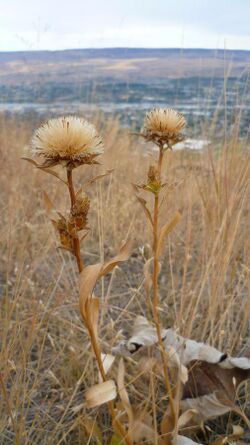Biology:Pyrrocoma carthamoides
| Pyrrocoma carthamoides | |
|---|---|

| |
| Scientific classification | |
| Kingdom: | Plantae
|
| (unranked): | |
| (unranked): | |
| (unranked): | |
| Order: | |
| Family: | |
| Tribe: | |
| Genus: | |
| Species: | P. carthamoides
|
| Binomial name | |
| Pyrrocoma carthamoides Hook.
| |
| Synonyms | |
|
Haplopappus carthamoides | |
Pyrrocoma carthamoides is a species of flowering plant in the aster family known by the common name largeflower goldenweed.[1] It is native to western North America from British Columbia to northeastern California to Wyoming, where it is known from grassland, woodlands, forests, barren areas, and other habitat. It is a perennial herb growing from a taproot and producing one or more stems to about half a meter in maximum length, the stems reddish-green and leafy. The largest leaves are at the base of the stem, measuring up to 20 centimeters long, lance-shaped with spiny sawtoothed edges. Leaves higher on the stem are smaller and hairier. The inflorescence is a single flower head or a cluster of up to four. Each bell-shaped head is lined with phyllaries each up to 2 centimeters long. It has many yellow disc florets surrounded by a fringe of yellow ray florets up to 7 millimeters long; ray florets are occasionally absent. The fruit is an achene which may be well over a centimeter in length including its pappus.
There are three varieties of this species; var. subsquarrosa is an uncommon type known only from southwestern Montana and northwestern Wyoming.
References
- ↑ "Pyrrocoma carthamoides". Natural Resources Conservation Service PLANTS Database. USDA. https://plants.usda.gov/core/profile?symbol=PYCA3. Retrieved 16 October 2015.
External links
Wikidata ☰ Q7263763 entry

